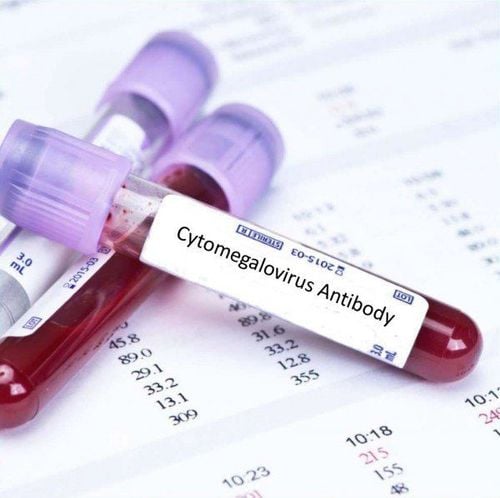This is an automatically translated article.
Cytomegalovirus (CMV) is a herpes virus that causes infections. The disease can be transmitted by contact with fluids, blood, saliva... of virus carriers. In particular, cytomegalovirus can be transmitted from mother to child during pregnancy. On average, 1 in 4 women becomes infected with CMV during pregnancy.1. Is CMV infection during pregnancy dangerous?
About 50% of pregnant women have had cytomegalovirus infection in the past. The cytomegalo virus remains in the human body for life. It exists in two forms, including a dormant (inactive) form and an active (recurrent) form. If a woman is infected with cytomegalovirus during pregnancy or the virus recurs during pregnancy, there is a more than 30% chance that the fetus will also be infected with the virus.Most of the time, fetuses infected with CMV after birth have no health problems. However, there are also some cases where this virus causes some birth defects in babies, such as microcephaly.
Transmission of cytomegalovirus can take place during pregnancy. The earlier the mother is infected with CMV, the higher the risk of birth defects or health problems, especially in the first 3 months of pregnancy. In addition, the baby can also catch the virus during labor or through breast milk when the mother breastfeeds. However, viral infections at this time usually pose little risk to health.
2. Symptoms of CMV . infection

Thai phụ nhiễm CMV có thể sốt nhẹ, người mệt mỏi, đau họng
Mild fever; Tired people; Sore throat; Swollen lymph nodes; Pneumonia. If you suspect that you have cytomegalovirus infection, you need to go to the hospital to perform a blood test to check, especially for women who are planning to become pregnant or have become pregnant.
3. Treatment of CMV infection during pregnancy
If the pregnant woman is positive for cytomegalovirus, the doctor will perform tests to check whether the fetus has been infected with this virus by amniocentesis and testing of amniotic fluid obtained, or by ultrasound examination to see if the fetus has been infected with the virus. Does the child show signs of infection?So far, scientists are still studying vaccines against cytomegalovirus as well as methods to prevent mother-to-child transmission of CMV.
4. The routes of infection with CMV . virus
Cytomegalovirus is a very common virus. It is worth mentioning that this virus is very contagious. Ways of CMV infection include:Contact with fluids, saliva, blood, urine... of people infected with the virus and then touch their mouth, nostrils, eyes; Having sex with someone who has the virus without using a condom; The fetus is transmitted from the mother through the umbilical cord; Babies are transmitted from their mothers through breast milk. On average, 7 out of 10 children between the ages of 1 and 3 years old will be infected with cytomegalovirus. In the process of taking care of children, family members are very susceptible to infection.
5. Measures to prevent cytomegalovirus infection

Rửa tay sau khi cho trẻ đi vệ sinh phòng ngừa nhiễm CMV
Use condoms when having sex with someone infected with cytomegalo virus; Wash hands after changing diapers, wiping nasal discharge... for children; Wash hands after using the toilet, pack and dispose of soiled diapers and tissues after use; Do not share utensils with someone infected with cytomegalovirus.
If you have unusual symptoms, you should be examined and consulted with a specialist.













